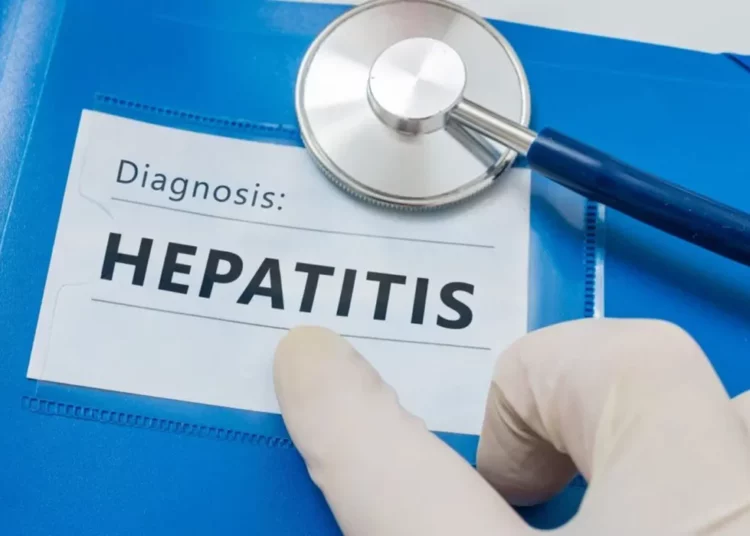In the restless, never-sleeping heart of Lagos, 53-year-old Kabir Oyedokun was a man always on the move. From dawn till dusk, the streets of Ijora Badia knew the sound of his voice and the steady hum of his vehicle, which he used for his transport business.
Every trip meant another meal on the table for his wife and their four children. But two weeks ago, everything stopped. The man who once weaved through Lagos traffic with boundless energy found himself struggling to even stand. An unexplained wave of fatigue clung to him, and a sharp, gnawing pain in his abdomen became his unwelcome companion.
At first, Kabir fought back the only way he knew, with over-the-counter pills and stubborn hope. But when the pain refused to leave, fear began to creep in, cold and unrelenting. He finally gave in and walked into a hospital, his heart pounding with dread. The doctor’s words hit him like a thunderclap: Hepatitis B. In that moment, the busy world outside seemed to fade. All Oyedokun could think of was his family and the uncertain road that lay ahead.
LEADERSHIP Data Miners’ findings showed that Oyedokun’s story is just one face in a staggering crowd, as behind closed doors in bustling cities and quiet villages alike, a silent killer is stalking Nigeria. Around 20 million Nigerians carry the heavy burden of viral hepatitis — 18.2 million with Hepatitis B and 2.5 million with Hepatitis C. Each year, 4,252 Nigerians lose their lives to liver cancer caused by untreated hepatitis. According to the World Health Organisation (WHO), Hepatitis is an inflammation of the liver that is caused by a variety of infectious viruses and non-infectious agents, leading to a range of health problems, including severe liver damage and cancer, some of which can be fatal.
Sadly, most people in Nigeria are not aware of Hepatitis B and C, and how to prevent themselves or get treatment if infected. Most of the over 20 million Nigerians living with viral Hepatitis B or C are undiagnosed, increasing the likelihood of future transmission to others and placing them at greater risk for severe, even fatal health complications such as liver cancer.
Hepatitis B Still A Major Health Threat In Nigeria
Hepatitis B remains a pressing public health challenge in Nigeria, with new figures showing that 8.1 per cent of adults aged 15 to 64 are living with the virus.
The World Health Organisation classifies Nigeria as a high-endemic country for HBV, with some of the highest infection rates found in the North West and rural communities. The disease is mainly transmitted through contact with infected blood or body fluids, including from mother to child during childbirth.
Experts said that if left untreated, Hepatitis B can cause severe health problems such as liver cirrhosis and liver cancer. The economic toll is also staggering, with an estimated N13.3 trillion to N17.9 trillion lost annually in direct and indirect costs.
They said that limited awareness, high costs of diagnosis and treatment, and inadequate access to care remain major obstacles to controlling the disease in Nigeria, stressing that increased testing, affordable treatment, and targeted awareness campaigns are critical to reversing the trend. The disease often wears the mask of something familiar.
Symptoms like fever, fatigue, and body weakness are shrugged off as malaria, and with a quick round of self-medication, the real enemy is left to feast on the liver, slowly pushing its victim toward failure, cancer, and death, experts explained.
Dr Mya Ngon Gasasira of WHO urged Nigeria to take bold, decisive action. In his words, hepatitis is not a rare affliction but a massive, under-recognised threat — one that grips millions across the country. He added that across the WHO African Region, over 70 million people live with chronic hepatitis B or C, yet fewer than one in ten know their diagnosis or receive treatment.
A Consultant Gastroenterologist at the University of Abuja Teaching Hospital, Gwagwalada, Dr. Ameh Ojonugwa, told LEADERSHIP Weekend that at least 20 million Nigerians are living with hepatitis B, the leading cause of liver disease in the country. Dr. Ojonugwa said Nigeria lies within a hepatitis B endemic zone, with national prevalence rates ranging between 8 and 15 per cent, averaging 10 per cent. This, he said, means “about one in every 10 Nigerians carries the virus,” putting millions at risk of chronic liver damage.
“The commonest cause of liver disease in our environment is hepatitis B, followed by hepatitis C, and then alcohol. The burden is high because we are in an endemic region, especially for hepatitis B,” he stated.
Hepatitis B vs Hepatitis C
Dr. Ojonugwa explained that hepatitis B is not curable but preventable through vaccination, while hepatitis C is curable but has no vaccine. He noted that hepatitis C affects about 1–2 per cent of the population, making its prevalence far lower than hepatitis B, but still a public health concern. He stressed that hepatitis B is spread mainly through contact with infected blood and blood products, not casual contact such as sharing meals or living in the same household.
Low Vaccine Coverage, Rural Gaps
While the hepatitis B vaccine is part of Nigeria’s National Programme on Immunisation (NPI), Dr. Ojonugwa lamented that coverage remains inadequate, especially in rural areas where most childbirths occur without proper immunisation facilities.
“If we make it mandatory that every child born is vaccinated, in 20 years hepatitis B could be history in Nigeria. But vaccine access is still largely limited to big hospitals and some primary healthcare centres,” he said.
Dr. Ojonugwa urged the government to adopt an aggressive public awareness and testing strategy similar to Nigeria’s past HIV campaign.
“In the HIV era, even the most remote villages heard about prevention and free testing. Hepatitis awareness is still largely city-based and fragmented. We need massive campaigns, free testing, and consistent vaccination nationwide,” he said.
He stressed that sustained government commitment and community engagement are critical if Nigeria is to reduce its high burden of hepatitis-related liver disease.
Hepatitis Treatment Out Of Reach For Many Nigerians
Dr. Ojonugwa said that for hepatitis C, a complete three-month course of curative antiviral drugs costs about ₦600,000, with the cheapest monthly supply priced at about ₦200,000, depending on where the patient is buying the drug from. According to him, hepatitis B treatment is even more complex, saying that although it has no cure, patients must undergo extensive testing before starting lifelong treatment.
“The initial tests, including viral load, are about ₦40,000, kidney and liver function tests, and abdominal scans, in addition, can cost up to ₦100,000. Once on treatment, patients spend about ₦20,000 monthly for medication, often for the rest of their lives,” he explained.
The physician said the financial burden becomes overwhelming when hepatitis progresses to liver cancer. Early-stage cases may benefit from surgery or transplants, but advanced cases are treated only to improve quality of life. Treatment at this stage costs from ₦8 million upward, he said.
“A liver transplant, which remains unavailable in Nigeria, can cost about ₦40 million abroad. We don’t have enough trained specialists, and most of the few we have are concentrated in major cities. Across the country, there are only between 100 and 150 gastroenterologists,” he explained.
Meanwhile, the Coordinating Minister of Health and Social Welfare, Prof. Ali Pate, recently raised alarm over the country’s hepatitis burden, revealing annual economic losses estimated between ₦13.3 trillion and ₦17.9 trillion in direct and indirect costs. Prof. Pate said that over 20 million Nigerians are living with viral hepatitis; 18.2 million with Hepatitis B and 2.5 million with Hepatitis C, making Nigeria the third most affected country in the world. He also said that more than 90 per cent of those infected remain undiagnosed.
According to the minister, hepatitis symptoms often mimic malaria, leading to misdiagnosis and dangerous self-treatment while the virus quietly damages the liver. Untreated cases can result in liver failure or cancer, killing over 4,200 Nigerians annually. Despite the availability of vaccines and curative treatments, he noted that transmission rates remain high due to low awareness, poor vaccination coverage, and delayed diagnosis.
However, the minister said the federal government has launched a year-long nationwide campaign aimed at eliminating Hepatitis C and halting Hepatitis B transmission by 2030.





